How to Stop Gaining Weight from Anxiety
[This is a guest post from Sandra Glavan, Anxiety Coach and Founder of Amosuir, about how to stop weight gain caused by anxiety. She shares some great tips and information for anyone interested in reducing their anxiety and losing weight.]
Anxiety makes life very complicated.
The things that most people do without a second thought can be incredibly challenging for an anxiety sufferer.
Anxiety can affect every area of your existence, including:
- sleep quality
- eating patterns
- social life
- concentration and energy levels
- motivation
- confidence and self-esteem
- work performance
- and more
AND, it can affect your ability to lose weight.
If you’ve been trying to shed excess pounds, but just can’t seem to do it, I get you 100 percent.
Your anxiety could be the culprit, and the reason why you can’t stop gaining weight.
But rest assured, that there are ways around this, and I’m going to help you.
The key is to use gentle weight-loss strategies as they’re more effective for people with anxiety.
As an anxiety coach who helps people reduce anxiety through changes in diet, lifestyle and mindset, I’m going to share with you:
- What anxiety is,
- What anxiety’s common symptoms are,
- How anxiety can cause weight gain, and
- 10 ways to stop gaining weight from anxiety.
This post may contain affiliate links, which helps keep this content free. Please read our disclosure for more info.
What is Anxiety?
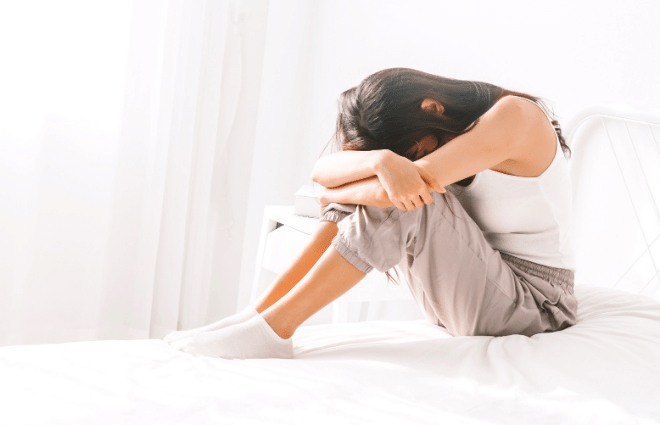
Anxiety is your body’s response to stress. It’s a feeling of unease, fear or apprehension about what’s to come.
This is a natural reaction in highly stressful and dangerous situations, and can even be helpful. For example, when a bear is chasing you.
It’s also normal to experience anxiety now and again, such as when going to an exam, an interview, or a first date.
But if you feel anxious often, and about everyday life situations, this is not your natural state and will feel far from normal.
Anxiety can vary from mild to severe and there are various types of anxiety disorders.
The main ones include generalized anxiety disorder, social anxiety disorder, panic disorder, and obsessive-compulsive disorder; and while there are major differences between them, they also share a few common symptoms, like:
- Excessive fear and worry
- Feelings of tiredness, sadness, and anger
- Nervousness, and restlessness
- Irritability
- Sleep problems
- Avoidance of certain people, places and situations
- Difficulty being assertive
- Rapid breathing
- Pounding heart
- Muscle tension
- Low energy
- Trouble concentrating
If you experience excessive fear and worry plus one of the other symptoms listed above for longer than two weeks, it’s important you see your local doctor to get a diagnosis, and to eliminate any other possible health issues.
How Can Anxiety Cause Weight Gain?
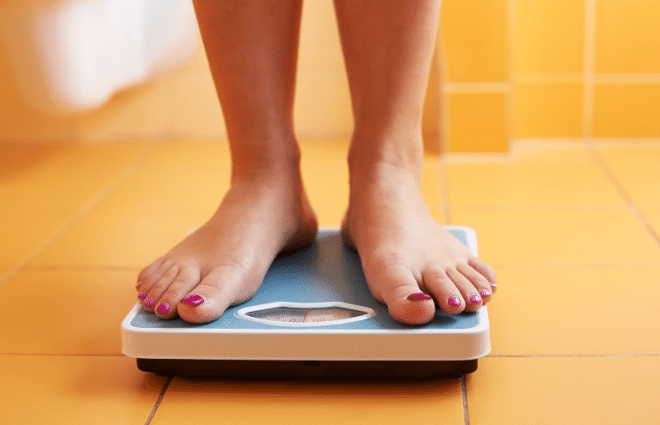
Anxiety Loves Sugar
Lots of people crave sugary foods when feeling anxious.
Why?
Studies show that sugar can temporarily relieve stress by suppressing the hypothalamic pituitary adrenal (HPA) axis in your brain, which controls your response to stress.
But if you keep giving in to your sugar cravings, by consuming either refined sugars or healthy foods high in simple sugars such as:
- Sweet fruits (pineapples, oranges, watermelon, and melon)
- Fruit smoothies and fruit juices
- Healthy sugars (agave and honey)
- Processed foods (cakes, chocolate, milkshake, candy, and soda)
… you’re going to have too much glucose in your blood.
This is a problem for your weight, because excess sugar in the blood gets stored as fat.
Foods that are high in simple sugars can cause sudden spikes and dips in blood sugar, which can lead to more cravings, and anxiety-like symptoms.
Eating cakes and watermelon is of course not the same, as watermelon has nutritional value.
But to manage your anxiety and sugar cravings you need to limit your consumption of fruit, and especially sweet fruits.
Remember, all the nutrients found in fruit can also be found in vegetables.
Anxiety Finds Comfort in Food
When you’re feeling anxious, worried, tired, or sad it’s common to find comfort in food. This is called emotional eating which often leads to overeating.
That’s because in those states your mind is going to be occupied with anything else other than your meal and you’re likely to continue eating even after you’re full.
When you don’t burn more calories than you consume, the result is weight gain.
Anxiety Craves Junk Food
Anxiety not only loves sugar; it also loves junk foods in general.
Most people find comfort in foods such as chips, chocolate, ice cream, cakes, pizza, and burgers, and so when you’re anxious you’re more likely to crave unhealthy foods rather than a big plate of vegetables.
Processed foods have hardly any nutritional value and are high in added sugar and solid fats, which can lead to weight gain, nutritional deficiencies and more anxiety.
Anxiety Saps Energy
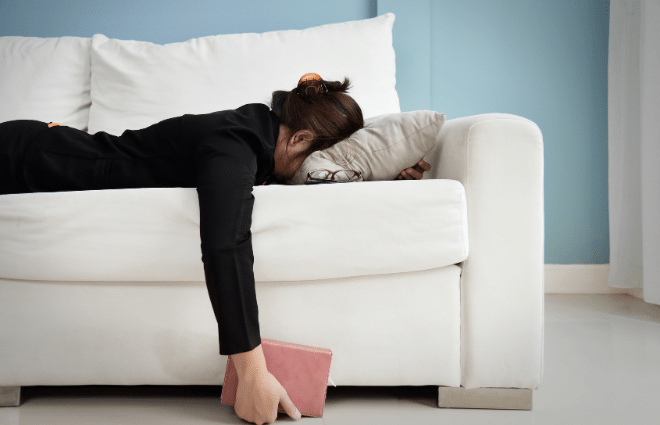
Anxiety is exhausting. Feeling worried, irritable and nervous throughout the day takes away a lot of energy and can lead to increased fatigue.
Low energy and fatigue are two common symptoms of anxiety.
If you have little energy and feel tired all the time, you’re not going to have any desire to exercise.
Even going for a half an hour walk can feel too much for an anxiety sufferer.
But without regular movement, the body is unable to burn excess calories, which leads to weight gain.
Anxiety Increases Cortisol
Anxiety triggers the release of stress hormone, cortisol.
Too much cortisol causes a lot of havoc to the body, including fat build up in the stomach, resulting in increased weight.
Excess cortisol also affects blood sugar level causing sudden drops in blood sugar and cravings for more food, which can lead to overeating.
The longer you experience anxiety, the more weight you can potentially gain.
Anxiety Disturbs Digestion
Anxiety can also disturb your digestion such as
- Make it slow and sluggish
- Cause foods not to be broken down properly
- Lead to inadequate nutrient absorption, and
- Reduce elimination of wastes and toxins from cells and out of the body.
If your body is unable to properly absorb essential nutrients – including carbs, fats, protein, vitamins and minerals – this will affect the body’s metabolism, lowering the rate at which it burns calories and leading to excess body fat as well as fatigue.
Also, unbroken food is likely to lead to inflammation and bloating, while excess toxins trigger more anxiety.
Anxiety Disrupts Sleep
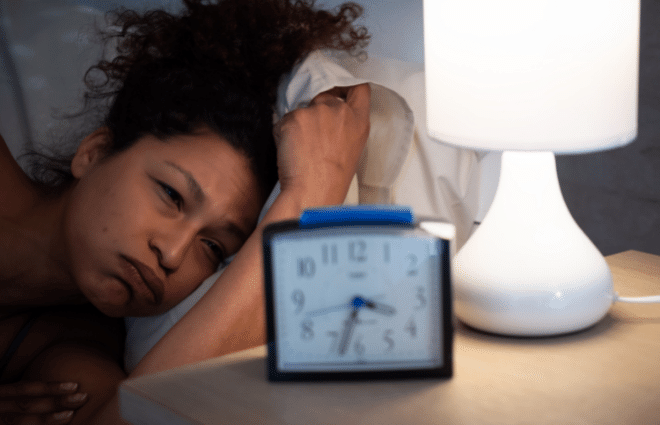
Feeling anxious often makes it harder to fall asleep and stay asleep through the night.
Sleep deprivation can cause more anxiety, creating a negative cycle between anxiety and insomnia.
On top of that, lack of sleep can have a negative impact on your weight.
According to research, not getting enough sleep can increase levels of the hunger hormone, called ghrelin, and decrease the levels of the satiety/fullness hormone called leptin, which could lead to overeating and weight gain.
How to Stop Gaining Weight from Anxiety
1. Adopt an Anti-Anxiety Diet
Eating a healthy and balanced diet is essential for physical and mental health, as well for reaching your natural weight.
But while all natural and healthy foods have beneficial nutrients, some foods are more effective at relieving anxiety than others.
Increasing your intake of foods that can relieve anxiety, and decreasing or eliminating foods that can trigger anxiety will give you optimal results for your mental health and weight.
So, what does an anti-anxiety diet include?
There are various anti-anxiety diets out there but I’m only going to comment on the one that helped me control anxiety.
The DOs
The main ingredients on this diet are as follows:
- Whole grains
- Vegetable
- Legumes
- Lean meats
- Healthy vegetable protein (fresh organic tofu)
- Nuts, seeds and extra virgin oils
- Less sweet fruits, and
- Herbs.
…and in the following proportions:
- 50% Whole Grains
- + 25% Vegetables
- + 10% Legumes / Meat Fish / Tofu
- + 5% Nuts / Seeds / Oils
- + 5% Less Sweet Fruit
- + Herbs
The DON’Ts
The foods that are avoided are processed foods but also a few other foods including:
- Dairy – as it’s high in simple sugar (lactose). But also because dairy contains casein, a milk protein that has been linked to increased stress, anxiety, depression, cognitive failures, and poorer memory functioning, as well as many other health issues.
- The only exception is natural liquid whey made from organic whole fat non homogenised milk (not whey powder). Whey is a milk protein, but unlike casein, it’s very beneficial for health, and is a great anti-anxiety drink.
- Foods that are too spicy, salty, sweet or sour as these can trigger the release of adrenaline, adding to the level of stress hormones already triggered by your daily anxiety. For example,
- Citrus fruits
- Vinegar (apple cider vinegar)
- Spices (fresh ginger, turmeric, cinnamon)
- Fruit juices and fruit smoothies
- Salty foods (vegetable chips, sardines)
- Tomatoes in any form including fresh tomatoes as they are highly acidic foods. Anxiety in itself causes acidity in the body which can lead to inflammation, and according to research inflammation is linked to increased anxiety levels. Avoiding foods that can intensify acidity in your body is essential.
https://www.youtube.com/watch?v=l3hQrXM7stg
2. Practice Mindful Eating
Mindful eating is a highly beneficial practice for your health because it increases nutrient absorption, improves digestion, and can help to calm you down.
To practice mindful eating at every meal you need to be fully present with your food.
Devour each bite, noticing the flavors, colors, smells, and textures. Eat slowly and aim to chew every bite 30 times or more.
If you watch television, or check your phone while eating, you won’t be able to practice mindful eating, so try to avoid all distractions at mealtimes.
3. Eat Your Last Meal Earlier
Your metabolism is slower at night and to avoid undigested food that can lead to inflammation and more anxiety, it’s best to avoid eating 3 hours before bedtime.
This will help you sleep better.
The earlier you have your last meal the better it will be digested.
4. Consume Three Main Meals and Two Snacks
The best way to manage your anxiety between meals is to eat three main meals (breakfast, lunch and dinner) and a healthy snack in between.
For example, on most days I have an apple, a pear, or a green banana as a healthy snack between meals, which I find to be effective at managing cravings and anxiety.
5. Introduce Gentle Exercise
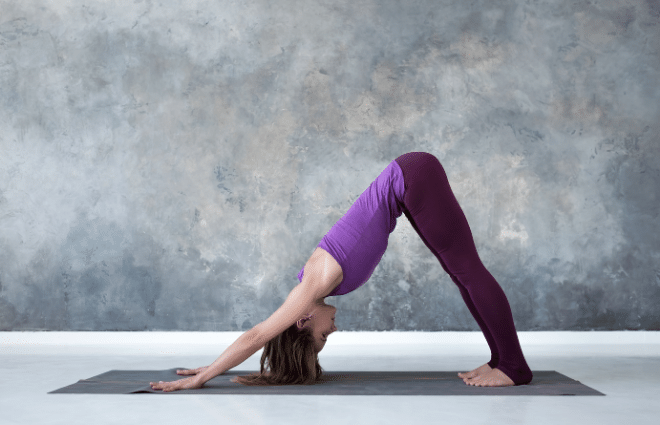
Movement is essential for burning calories and controlling anxiety.
But as mentioned previously, when you’re suffering from anxiety it’s hard to find the strength, energy or the motivation to take part in any physical activity.
Pick gentler forms of exercise but make sure that you practice daily.
That’s the trick. Gentle but regular.
For example, the following routine proved to be highly effective for managing my anxiety and weight.
This is not something that I started doing overnight.
I had to build up to this routine gradually, and that’s what I recommend for you too, especially if you’re not exercising at all right now.
You can also check out Avocadu’s Yoga Fat Loss Bible, which is perfect for beginners and has a thorough, step-by-step program to help you lose weight and through gentle, daily yoga practice.
But once you build up your strength and energy and start to control your anxiety, you can adopt more strenuous forms of exercise.
6. Go to Sleep close to 22:00
You need to get quality sleep to manage your anxiety and weight.
I’ve found that following the ayurvedic clock – waking up before sunrise and going to bed before 10 p.m – is the most effective sleep routine for mental health.
According to ayurveda, “the body uses the four-hour period (from 10 p.m. to 2 a.m.) to digest experiences, emotions, and any remaining food from earlier in the day, and to repair and renew itself.”
Going to bed after 23:00 or midnight is likely to make you feel tired in the morning, because our bodies are designed to rest when it’s dark and to get going with sunrise.
If you aim to develop a sleep pattern as close to the ayurvedic clock as you can, you’ll find that your sleep quality and mental health improves.
7. Eliminate Alcohol and Caffeine
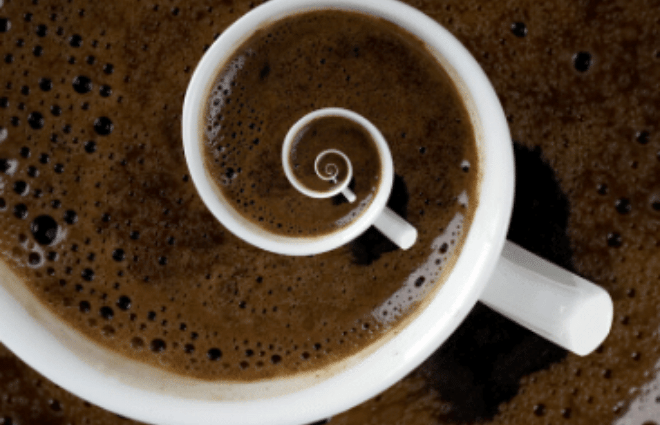
Alcohol and caffeine are stimulants and although they temporarily relieve anxiety, they also trigger worse anxiety hours later.
Even if caffeine gives you a false impression that you can skip a meal, once its effects wear off, your worse anxiety hours later can lead to overeating.
I used to consume both caffeine and alcohol in excess for many years, but when I began my healing journey, I decided to cut out both and I’ve never looked back since.
8. Commit to a Relaxation Technique
If you want to control anxiety you need to adopt a daily relaxation technique.
For example, listening to relaxing meditation music or breathing deeply for 10-15 minutes is all that you need in the beginning.
This kind of practice can help to center and balance you each day. You can think of relaxation as your daily reset.
If you keep your relaxation practice simple, you’re more likely to do it often, and the more you practice, the sooner you’ll start to reap the benefits.
Relaxation techniques are essential for training the brain to be in the present moment.
When you’re present, you cannot be worried or fearful, which can immediately reduce anxiety.
Meditation has also proved to reduce cortisol levels and provide a long list of mental and physical health benefits, so it’s a must for every anxiety sufferer in my opinion.
Try this short 5-minute meditation this evening:
https://www.youtube.com/watch?v=BmKCzvS0Zhc
9. Sip on Chamomile Tea
Chamomile tea made from loose chamomile flowers is one of the best anti-anxiety drinks.
Many studies have shown that the consumption of chamomile is beneficial for people with anxiety.
What’s more, chamomile stimulates weight loss, reduces bloating, and helps to get rid of toxins and excess water.
It also acts as a sleep aid.
Click here to check out our recommendation for loose chamomile flowers on Amazon.
10. Take a Magnesium Supplement
According to studies, people with anxiety tend to be low in magnesium.
This essential mineral is necessary for controlling anxiety, calming the nervous system, getting quality sleep and proper functioning of the metabolism.
If you’re suffering from anxiety, definitely look into taking a magnesium supplement.
But not all magnesium supplements are the same. Some are more absorbable than others.
I have been consuming magnesium chloride powder (food grade) for years which I dilute in water and drink every evening before bed.
I can’t stress enough how much this supplement has changed my life.
Click here to see our favorite magnesium supplement on Amazon.
Final Comments
Anxiety makes life more complicated, and that’s why tackling weight issues has to be handled with more care.
So, even if it takes you longer to get your weight back on track, by following the 10 ways outlined above, you’ll be able to control your anxiety and weight long term.
About the Author

Hi, I’m Sandra Glavan. I’m an Anxiety Coach, and founder of Amosuir, a website for helping people reduce anxiety naturally through changes in diet, lifestyle, and mindset, as well as through the development of self-love.
After struggling with chronic anxiety for 20 years, I finally managed to overcome this mental condition, and today I teach others how to apply my success formula.
In addition to my personal anxiety experience, I also hold diplomas in Anxiety Awareness, Life Coaching, Cognitive Behavioral Therapy (CBT), Psychotherapy and Counselling, Holistic Nutrition, Advanced Nutrition, and Vegetarian & Vegan Nutrition, Stress Management, and Yoga. You can read more here.
